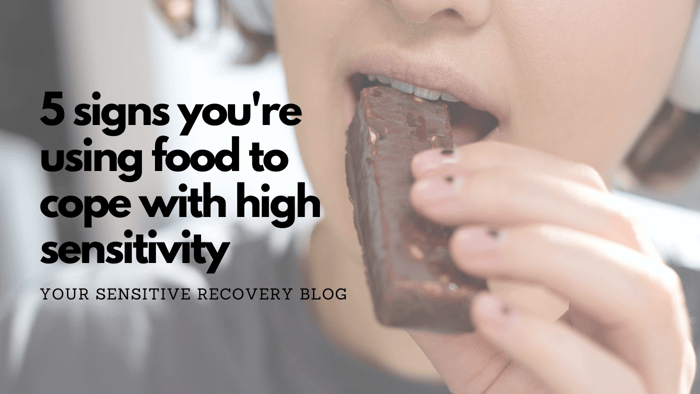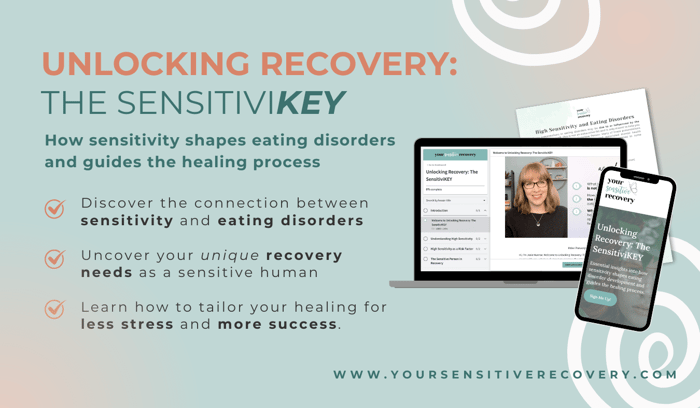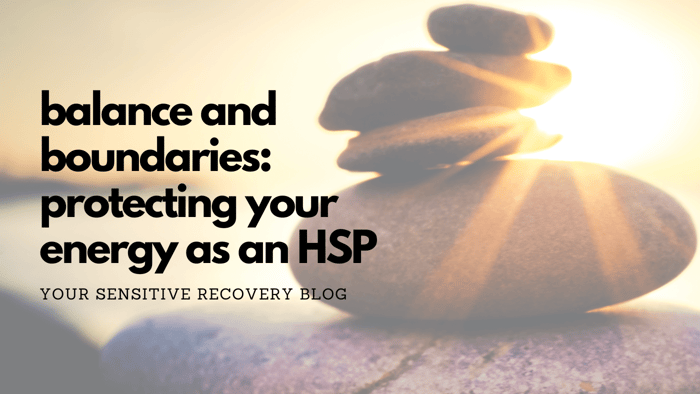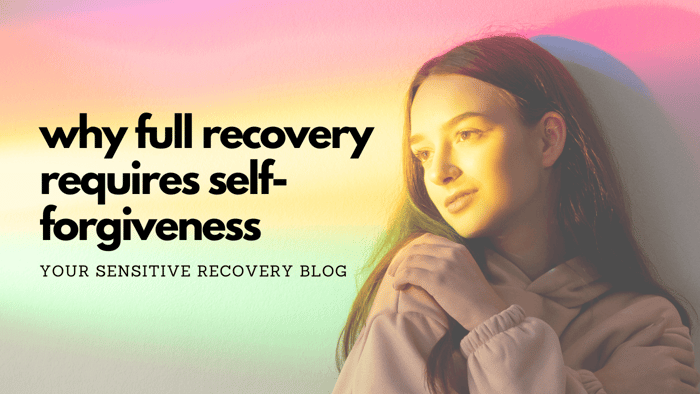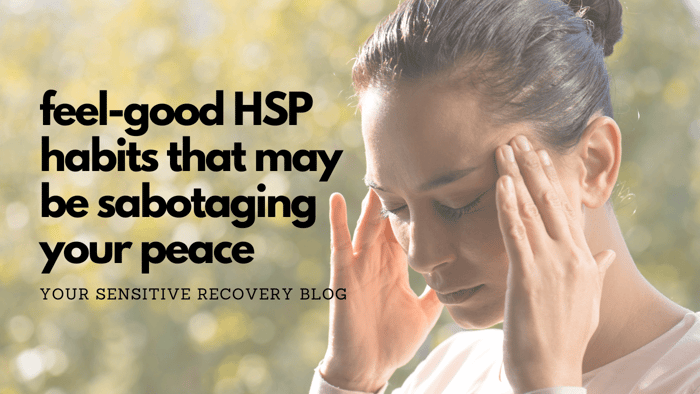As a Highly Sensitive Person, navigating the world can often feel overwhelming. The intensity with which we experience emotions, process information, and respond to the environment can lead us to seek comfort in different ways. For many HSPs, food (or the over-control of it) becomes a powerful, self-perpetuating coping mechanism.
Whether it's using food to numb emotions or quiet the mind, or using it in a way that gives you the illusion of control, the relationship between High Sensitivity and disordered eating habits can be complex and tricky to untangle. Because disordered eating can have many root causes, it's important to stay open to new knowledge and understanding that may come to you during your recovery journey.
In this post, I explore 5 signs that your High Sensitivity may be negatively influencing your relationship with food and what you can do instead.
Sign #1: You seek out food to recharge mentally or emotionally, regardless of your physical hunger level.
A Different Approach: Highly Sensitive People indeed need more time than others to recharge and bounce back from fatiguing activities and experiences. Sometimes, simply bringing awareness to your habit of turning to food can be enough to start making changes. Take a minute to check in with your hunger-fullness cues before heading to the kitchen. If you're indeed experiencing physiological hunger, give yourself full permission to eat. If you find you're more hungry for the idea of food, ask yourself what other things feel recharging to you? Perhaps you need to lie down in a quiet room for 15 minutes, or take a shower to "rinse off" the accumulated stress and stimuli. At first, you may want to try a combination of getting some a meal or snack and engaging in another rejuvenating activity. Above all, watch how you talk to yourself if you end up choosing to eat. No shaming yourself. Neither being hungry nor working toward being a more attuned eater deserves any mean comments from the internal peanut gallery.
Sign #2: You're preoccupied with how food choices might disrupt your physical or emotional balance.
What's Happening: You feel overly anxious or perfectionistic when making decisions about what or when to eat. Because you are so tuned in to how food makes you feel physically, you may often delay or avoid eating because of the stress around potential discomfort such as bloating or heartburn.
A Different Approach: Being attuned to your body is wonderful, but it's possible for an HSP to pay too much attention to their body sensations, to the point of increased stress and analysis paralysis. To start shifting this pattern, self-compassion is key. Kindly remind yourself that food choices don't need to be perfect to support your sensitivity, your health, or your recovery. Instead of striving for rigid control, start tuning into how your body feels in the moment, trusting gentle, intuitive cues rather than external rules. For example, begin by noticing your body's response to whether you want something warm or cool. How about savory or sweet? Crunchy or soft? Questions like this create more space for nourishment that truly feels supportive, not stressful.
Sign #3: You often seek comfort by eating or through rigid eating patterns.
What's Happening: Both comfort-eating and rigid rules and routines around eating can provide HSPs with a sense of security and predictability, especially when other aspects of life feel overwhelming. While these habits may provide temporary relief, they can ultimately disconnect you from your true needs and your body's hunger-fullness signals.
A Different Approach: First, it's important to acknowledge that it's okay to seek comfort in food at times, but doing so with awareness, rather than with mindlessness or fear, is key to fostering a healthy relationship with eating. HSPs can practice pausing before meals or snacks to check in with the question, “What emotions am I experiencing right now and what unmet needs might I have?" By gently exploring what lies beneath the urge to eat for comfort or cling to strict rules, HSPs can gradually replace these habits with more mindful, flexible choices. If you're dealing with several food rules or eating habits you may want to work on removing them one-by-one instead of all at once. It's important to build your emotional tolerance to eating without your routines in a way that feels safe and is sustainable. Get help from an eating disorder therapist, dietitian, or coach, if needed.
Sign 4: You plan out disordered eating behaviors as a "reward" after certain activities or experiences.
What's Happening: It's not uncommon for folks to plan, for example, a binge or a fast as a reward for getting through something challenging or tiring. For HSPs, that "challenging" thing can be simply getting through a day in this often overstimulating world.
A Different Approach: A key step to moving away from this habit is reframing the idea of a reward. A healthy reward comes in the form of something self-nurturing. Because rewards promote the idea that you've earned something, you don't want to encourage the pattern of 'earning" something that is ultimately harmful to you. This is self-punishing and never works to truly better ourselves. It's also important for Highly Sensitive folks to recognize that this type of reward planning often stems from emotional exhaustion or a deep need to replenish comfort. HSPs can start by finding alternative ways to soothe themselves after challenging moments, such as engaging in calming rituals like deep breathing, journaling, gentle movement, a phone call with a good friend.
Sign #5: You restrict the amount or type of food you eat to alleviate the fear of being "too much."
What's Happening: HSPs may consciously or unconsciously use food restriction as a form of self-punishment for a whole host of reasons. If someone has a strained relationship with their sensitivity (stemming from the all-too-common comments like, "You're too sensitive" or, "You shouldn't take things so personally") they often carry guilt and shame for simply being themselves. And food restriction becomes an easy tool with which to beat themselves.
A Different Approach: A little louder for the folks in the back...YOUR SENSITIVITY IS A GIFT, not something to eliminate or suppress! Shifting away from restriction as self-punishment starts with self-compassion and the understanding that your needs, including your need for food, are always valid. You deserve to be fully cared for, emotionally, mentally, and physically, just as you are. A fun way to start challenging thoughts of restriction or not being "deserving enough" of food is to replace the need for eat with the need to pee. Just look at how ridiculous the thoughts you have about eating sound when you connect them to emptying your bladder instead: "I peed two hours ago. It's too soon to pee again" , "I didn't pee healthily yesterday, I should try not to pee today" , "That person isn't peeing, so I shouldn't either" , "I heard I shouldn't pee after 7p." Silly, right? 😜
Sensitive and Healing
Recognizing the ways in which your high sensitivity influences your relationship with food is an important step in creating a healthier, more balanced connection to nourishment. While it may feel comforting to use food or the restriction of food to cope with overwhelm, emotional intensity, or sensory overload, it will likely compound those challenges over time.
You can absolutely break these damaging cycles and instead create routines that support your mental, emotional, and physical wellness.
One of the reasons why I created Your Sensitive Recovery was to help Highly Sensitive People understand that they do not have to become less sensitive to recover from their eating disorders. By learning about your trait, and embracing the fullness of who you are, you can empower your sensitivity, heal your relationship with food and your body, and learn to truly thrive.
I believe in you 🥰
✨ Josie Munroe, LMFT is a licensed therapist and owner of JosieMunroe.com and Your Sensitive Recovery. As a recovered clinician and Highly Sensitive Person, she loves supporting others on their journeys to form new, empowered relationships with food, their bodies, and their sensitivity. Join the newsletter for a weekly boost of hope and inspiration. You deserve a recovery that works for you! ✨

